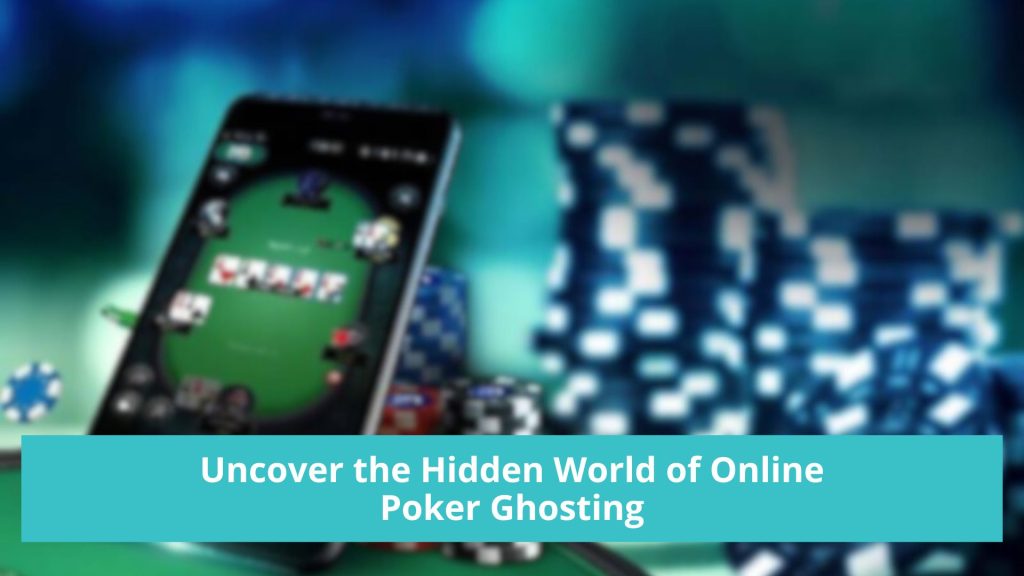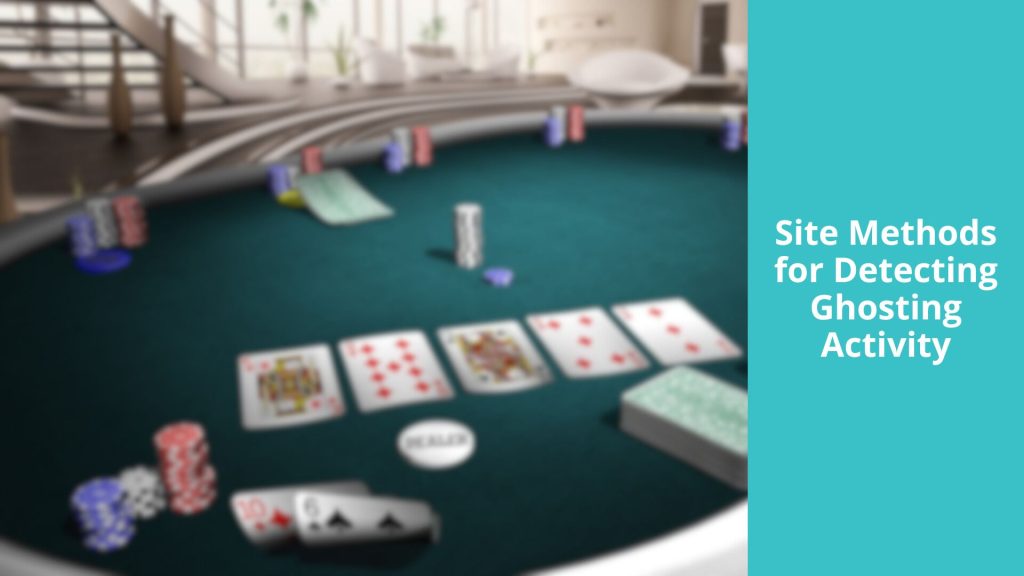Uncover the Hidden World of Online Poker Ghosting

Ever wonder if some players have secret advantages in online poker you can’t see? The world of “ghosting” remains largely invisible yet drives real impacts on gameplay and site integrity. By understanding this emerging threat, you can better protect your interests and advocate for positive change. As we explore ghosting’s growth, ethics and detection methods, you may uncover new perspectives on risks facing players. But knowledge and smart precautions also empower you to find fair games where skill thrives. By engaging openly with integrity concerns, our shared poker community can reduce misconduct while nurturing the game’s highest virtues.
Common Ways Ghosts Cheat in Online Poker
- Getting live advice on playing strategy, including optimal betting sizes, whether to call/fold, best bluff spots
- Seeing opponent hole cards for huge informational edge
- Sharing hole card info with partner at the table to collaborate against opponents
- Tracking opponent tendencies over time to exploit playing patterns
- Avoiding regular detection through IP changes, multi-accounting
The problem extends beyond just ghosting partners. Many crews run online cheating operations using really sophisticated strategies:
- Stables operate networks of ghosted players to build a bankroll
- Grindhouses fill tables with ghosted players for guaranteed profit
- They target recreational players to maximize ROI long-term
So ghosting threatens the backbone of poker’s integrity. But sites are catching on and penalizing violators more aggressively to protect normal players.
Ghosts’ Impacts Across Key Gameplay Metrics
Ghosting gives players huge advantages that undermine fair competition in poker:
| Metric | Advantage Gained |
| Win Rate | +15-25 BB/100 hands |
| Return on Investment | 150-300% higher |
| Risk Management | Nearly eliminated |
| Exploitability | Much lower by hiding leaks |
When ghosts access privileged information on opponent holdings and patterns, it enhances decision making in ways that normal players can’t match over time.
The data advantage converts directly to higher win rates. And risk drops drastically when you see cards and sequences before they develop. So ghosts profit easily with less variance.
This directly reduces the edges of legitimate players playing properly. And it saps enjoyment out of the game when ghosts are present. Regulating sites must expand detection to uphold poker’s competitive integrity.
See the article about Poker Ghosters Exploiting.
Advanced Ghost Setups Running Rampant
Sophisticated ghosting operations use advanced strategies to maximize edge:
- “Bum Hunting” – Target weakest players for highest win rates
- Anti-Detection – Rapid IP rotations and account switching
- Ratholing – Drive up winrates by leaving positive tables
- Table Selection – Scout for best ghosting opportunity
- Hole Card Sharing – Partners see each other’s cards
And they often operate in teams for combined advantages:
- Stables – Networks of ghosted players backed by investors
- Grindhouses – Ghosts round the clock in structured shifts
- Partnerships – On-table collusion between ghosted players
The economic incentives drive innovation in tactics. Some crews develop machine learning models to refine decision making. The advanced operations pose a real threat.
Impacts of Ghosting on Major Poker Tournaments
Ghosting has plagued even the highest stakes tournaments, undermining competitive integrity:
| Tournament Series | Ghosting Scandals | Consequences |
| WSOP | Regular allegations of stables/partnerships | DQs, bans, bracelets revoked |
| WPT | Mike Postle $10m+ cheating scheme | Refunds, lawsuits, criminal charges |
| partypoker LIVE | Stream hacking, RFID card readings | Tech overhaul, anti-ghosting initiatives |
| PokerStars SCOOP | Table selection bots, bumhunting mods | Account closures, enhanced security |
The livestreams and prize pools act like catnip to ghosts. But the sites are expanding teams to analyze hand histories for violation patterns. And gaming commissions resource dedicated integrity units to sanction violators.
The goal is preventing recurrence and rebuilding trust in major tournament brands. It’s an ongoing battle as tactics evolve, but progress is happening.
Key Ethical Questions on Ghosting Behavior
Ghosting presents a complex ethical dilemma with valid perspectives on both sides:
- Is it morally wrong to break rules for personal gain?
- Are poker sites responsible for better controlling cheating?
- Should ghosts face legal consequences for their actions?
The poker community remains divided on approaches:
- Absolute Stance – Ghosting is unethical cheating, no exceptions
- Pragmatic Stance – Increased incentives drive misconduct
- Sympathetic Stance – Ghosts are skillful players overall
Much debate stems from the “angle-shooting” culture ingrained into poker history. But many high-profile cheating scandals crossed clear ethical lines that damaged poker’s reputation.
Sites must clarify policies and deter misconduct. But players also need better ethics education on integrity-threatening behaviors. Achieving alignment across stakeholders can uphold ethics while still allowing skillful play.
Site Methods for Detecting Ghosting Activity

Poker sites are expanding teams and tools to catch ghosts in the act:
| Approach | Description | Efficacy |
| Hand Histories | Complex analysis of decision patterns over hands | High for consistency mismatches |
| Player Metrics | Win rates, risk metrics, exploitability factors | Medium for outliers |
| Table Selection | Detecting bumhunter scouting behavior | Low, hard to prove |
| Multi-Accounting | Linking accounts by metadata, behavior | High when identifier slips |
| Machine Learning | AI assessing decision optimality | Promising for cost efficiency |
And sites are making it easier to report suspicious activity, though critics argue more false positives. Players should document relevant hands and metrics if they believe ghosting occurred.
Ensuring game integrity is an arms race against increasingly sophisticated tactics. But sites seem committed, knowing trust is critical for poker’s growth potential.
Safeguarding Against Ghosting in Online Cardrooms
As a player, you can take proactive steps to avoid ghosts and maintain fair games:
- Select Reputable Sites – Play only on regulated sites investing in integrity
- Analyze Metrics Carefully – Monitor win rates, risk profiles for anything suspicious
- Protect Your Screen – Never show hole cards if others could be watching
- Vary Game Selection – Change formats and limits to avoid pattern detection
- Report Suspicions – Document hands and contact support for further investigation
Players should be vigilant rather than paranoid. Poker thrives on reads, soul reads and creative play. But anything consistently nonsensical could suggest ghost assistance.
Maintaining constructive skepticism, while avoiding toxicity accusations, allows protecting oneself and the broader player pool too.
Stables Building Network Scale Through Ghosting
Stables represent coordinated groups governing networks of players:
| Metric | How Stables Use Ghosting |
| Bankroll | Ghosts funded by staking to minimize risk |
| Scale | Expand number of accounts for asset diversification |
| Edge | Refine play quality and coach weaker members |
| ROI | Target softer games and maximize tournament payouts |
The structured approach lowers variance which attracts investors. Top stables report annual returns exceeding 300% through these leveraged ghosting models.
Critics argue staking and coaching are ethical if no real-time assistance. But many stables clearly violate integrity based on player testimony and statistical evidence made public.
Restricting multi-accounting and tracking coaching arrangements better could limit the practice. But stables are an ingrained part of poker so compromise is difficult across stakeholders.
Staying Clean of Ghosting Participation
If approached by a stable or ghost about collaborating, politely decline and consider these prevention tips:
- Don’t Share Accounts – Giving access risks terms violations
- Protect Screen Privacy – Never show hands with observers
- Review Site Rules – Clearly understand cheating policies
- Document Interactions – Log contacts for reporting if needed
- Change Passwords – Use unique credentials on all sites
Getting caught in ghosting schemes can mean lost money, banned accounts, and criminal fraud charges in some jurisdictions.
But early, explicit refusals of participation based on ethical stance protects from risk while allowing documentation for authorities if harassment continues. Players dedicated to integrity can maintain distance.
Final Thoughts on Ghosting Integrity
Ghosting erodes trust in online poker by enabling cheating and collusion that skews gameplay integrity. But players also have agency in mitigating risks through smart site selection, privacy habits, game mixing and reporting ethical violations when warranted.
Poker must balance skill advantages with fairness to thrive long-term. Though sites are making progress detecting sophisticated ghosting, achieving full integrity requires community diligence too. By understanding the issues and advocating positively for security improvements, players can help nudge poker in the right direction.